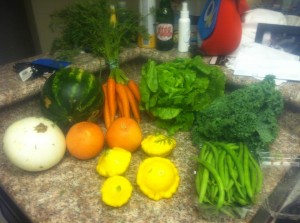CSA is here to stay!
November 2, 2012
Maybe you keep hearing people talk about their CSA box and you keep wondering what in the world are they talking about? You’ve probably come up with all kinds of possible meanings…
Chapman Sponsored Athletics? Cute Snuggly Animals (though you do wonder why they are keeping them in boxes)? College Survival Artillery (Which is probably where the school stores weapons and supplies to be used in the event of a Zombie attack)?
All those are excellent guesses, but not quite right.
CSA actually stands for Community Supported Agriculture.
What’s that you ask?
First: Its delicious!
Second: Its simple. A Community Supported Agriculture box is a box full of locally grown, delicious veggies and fruits are delivered to you. By signing up for a CSA box you are agreeing to support the local farmers by eating what is in season and growing locally.

This means that you are getting the freshest produce because its picked when it is ripe, not well before its ripe in order to ensure that it makes it across the country to where it will eventually be sold. It also means you are getting the tastiest produce. When food sits around for awhile it loses some of its deliciousness and nutritional value as well. If you’ve ever had a tomato right off the vine then you know what I’m talking about!
Eating local also makes a difference in the local economy. When you spend a dollar at a local owned business, that one dollar generates twice as much income for the local economy as money spent at a national chain. So not only does it taste better, but its better for your neighbors and community. I don’t know about you, but when I eat a meal and I know whose hands have prepared it, it tastes so much better! The same is true when I fix a salad from greens I bought at the farmers market or make a sandwich out of bread made by a local baker. I know that my purchase with them supported their business, their family, and my community.
Eating local also has a positive impact on air quality and helps reduce pollution. Local food doesn’t have to be trucked as far and therefore has less greenhouse gas emissions associated with it. In 2005, the import of fruits, nuts, and vegetables into California by airplane released more than 70,000 tones of CO2, which is the equivalent of 12,000 cars being on the road. WHAT?!?!
Local food also means more variety. When a farmer is producing food that will not travel a long distance, will have a shorter shelf life, and does not have a high-yield demand, the farmer is free to try small crops of various fruits and vegetables that would probably never make it to a large supermarket. Supermarkets are interested in selling “Name brand” fruit: Romaine Lettuce, Red Delicious Apples, Russet Potatoes. Local producers often play with their crops from year to year, trying out Little Gem Lettuce, Senshu Apples, and Chieftain Potatoes. I love opening up my CSA box and finding a new vegetable that I haven’t cooked with before.
I know what you are thinking. “That all sounds fine, well, and good, but isn’t eating local more expensive?”
Actually, it isn’t. When you eat foods when they are in season you are getting them when they are at their most abundant, and therefore least expensive. I love economies of scale!
If you want to give local foods a whirl, but aren’t really sure where to start I suggest signing up for your very own
CSA box
(or share it with a friend). Tanaka Farms delivers right to campus, as well as many other locations around So-Cal, once every two weeks for a very reasonable $23 (small box) or $33 (large box).
You won’t be sorry! You’ll be stuffed (with delicious veggies and fruits)!
